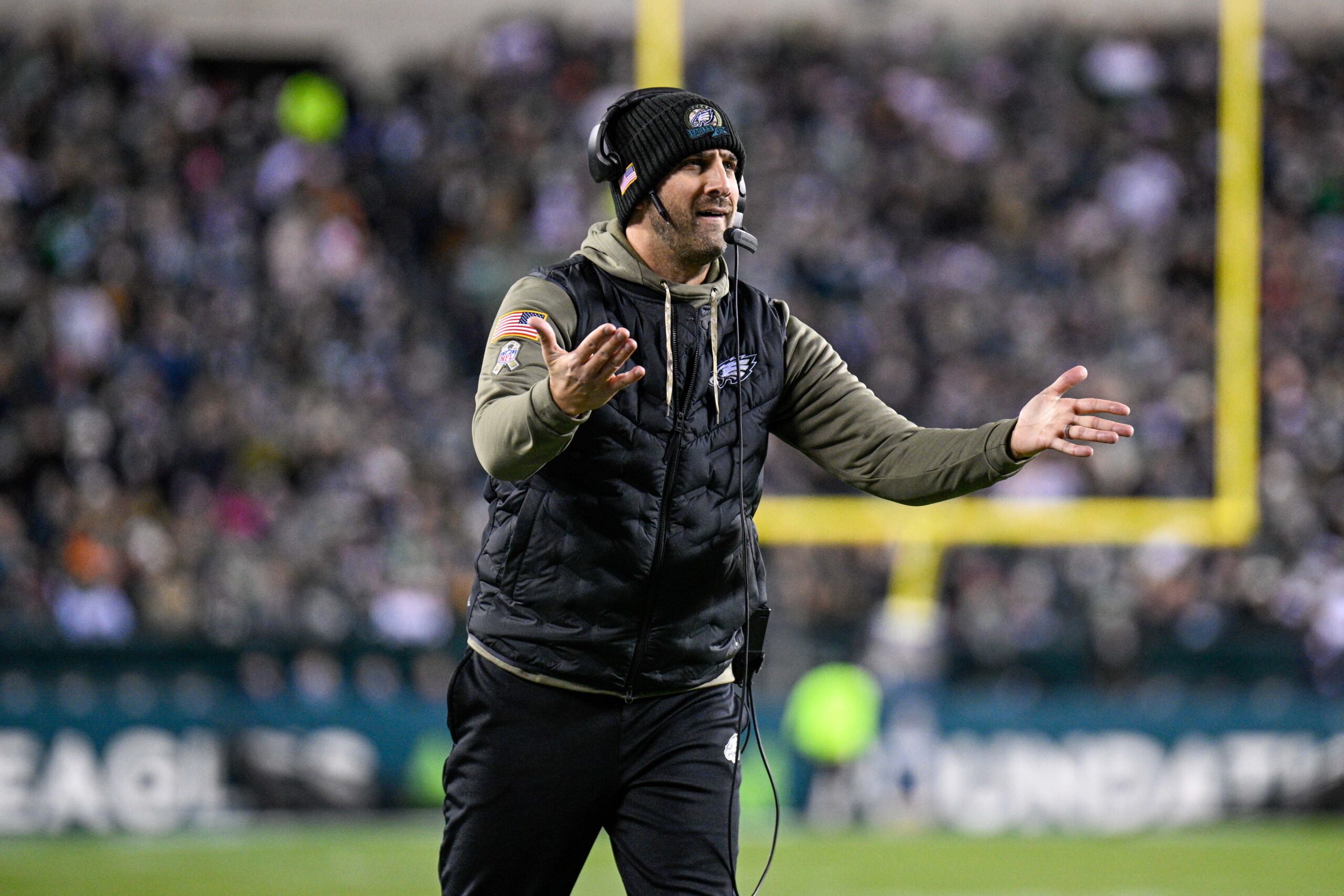The coaching problem faced by the Philadelphia Eagles stems from the significant transition between the accomplished Doug Pederson era and the current leadership of Nick Sirianni, highlighting challenges in play-calling and game tempo control. One key factor in a coach’s effectiveness is the ability to make timely and strategic play calls, influencing the team’s performance and outcome of games. For instance, during a critical game against a division rival, Sirianni’s decision to opt for several conservative plays instead of seizing opportunities to capitalize on the opponent’s weaknesses has led to scrutiny from fans and analysts alike. This exemplifies how playcalling directly impacts the team’s chances of success and the coach’s reputation.
The tempo at which the game is managed can dictate momentum shifts and player morale. A coach failing to control the tempo assertively can result in missed opportunities, defensive vulnerabilities, and an overall lack of cohesion on the field. In a recent matchup where the Eagles struggled to maintain a consistent offensive tempo, Sirianni’s play-calling approach appeared reactive rather than proactive, allowing the opposing team to dictate the game’s pace and ultimately leading to a loss. This highlights the intricate relationship between a coach’s decision-making during the game and the team’s overall performance, underscoring the critical nature of effectual play-calling and tempo management in coaching.
History of Coaching Changes in the Philadelphia Eagles
The Philadelphia Eagles have a rich history of navigating coaching changes with a focus on prioritizing future success over sentimentality, a principle deeply ingrained in the organization’s decision-making process. One notable instance was the departure of Doug Pederson, who, despite leading the team to a Super Bowl victory, faced a challenging end to his tenure due to a lack of alignment with the team’s vision for the future. This decision exemplified the Eagles’ willingness to make tough choices in the best interest of the team’s sustained success, even if it meant parting ways with a coach who had achieved significant milestones.
The potential coaching dilemma surrounding Nick Sirianni further underscores the Eagles’ commitment to upholding a standard of excellence and competitiveness within the organization. As uncertainties loom over Sirianni’s future with the team, the historical context of the Eagles’ coaching transitions provides insight into the critical role that coaching stability plays in shaping team dynamics and on-field performance. By examining past coaching changes and their repercussions on the team, it becomes evident that the Eagles’ management prioritizes a strategic approach to coaching appointments that align with the team’s long-term objectives and aspirations for sustained success in the NFL.
Doug Pederson’s Success and Legacy
Doug Pederson’s success with the Philadelphia Eagles extended far beyond their Super Bowl victory. During his tenure, key players like Carson Wentz were developed, and a cohesive team dynamic emerged that propelled the Eagles to the top of the league. Pederson’s coaching philosophy, which emphasized resilience, adaptability, and unity, resonated with the players and the fan base, creating a winning culture within the organization.
One example of Pederson’s impact was during the 2017 season when the Eagles faced numerous injuries to key players, including starting quarterback Carson Wentz. Despite these setbacks, Pederson’s strategic playcalling and ability to rally the team around backup quarterback Nick Foles showcased his leadership and coaching acumen. The team’s underdog triumph in Super Bowl LII against the New England Patriots is a testament to Pederson’s ability to inspire confidence and extract the best performances from his players in high-stakes situations.
Challenges Faced by Nick Sirianni
Nick Sirianni’s coaching tenure with the Philadelphia Eagles has been marked by significant challenges in play calling and game tempo control, which are crucial aspects of a head coach’s responsibilities. One notable instance that drew criticism was during a critical game against a rival team. Sirianni’s conservative play calling in the final minutes cost the Eagles a potential game-winning drive. This situation exemplified the impact of play-calling decisions on the team’s ability to secure victories and maintain momentum throughout the game.
Moreover, Sirianni’s struggle to effectively control the game’s tempo has been evident in several matchups where the Eagles fell behind early due to slow offensive starts. In these scenarios, the team’s inability to establish a rhythm and dictate the pace of play reflected Sirianni’s challenges in adapting his game strategies to different game situations. Fans and analysts have pointed out that the lack of assertiveness in play calling and failure to adjust the tempo according to the game flow has hindered the Eagles’ competitiveness in crucial moments. This highlights the importance of a head coach’s ability to make real-time decisions that can shift the game’s momentum in their team’s favor.
Fan Expectations and Reactions to Coaching Issues
The Philadelphia Eagles fans have a longstanding tradition of being passionate and vocal about their team’s performance. In the case of the current coaching dilemma, fans have not shied away from expressing their discontent with the lack of assertiveness displayed by Nick Sirianni on the field. For instance, during a crucial game where the Eagles were trailing by a small margin, fans were dismayed by Sirianni’s conservative playcalling, which failed to seize opportunities to turn the game in their favor. This instance sparked criticism on social media platforms and fan forums, underscoring fans’ significant role in evaluating coaching decisions and team performance.
Survey data has indicated a growing dissatisfaction among Eagles fans regarding the coaching staff’s ability to steer the team toward success. Fans are looking for wins and a coach who can instill a sense of confidence and strategic understanding in the team. The lack of proactive decision-making and the perceived hesitancy in crucial game situations have fueled fans’ calls for a more commanding presence at the team’s helm. By closely monitoring fan sentiments and reactions to coaching issues, the Eagles’ management can gauge the pulse of the fan base and tailor their coaching decisions to align with the expectations of the passionate supporters.
Ownership Dynamics and Coaching Staff Relationships
The relationship between ownership and the coaching staff is critical to the Philadelphia Eagles’ organizational structure. Ownership’s involvement in coaching decisions can significantly impact team performance and player morale. Insights from former players and coaching staff shed light on how ownership dynamics influence the team’s overall success and the working environment within the organization.
Furthermore, the history of ownership dynamics within the Eagles organization has showcased instances where ownership preferences influenced coaching decisions rather than solely based on on-field performance. For example, during Chip Kelly’s tenure as head coach, there were reports of clashes between Kelly and the front office, ultimately leading to his dismissal despite initial success. This highlights the delicate balance between ownership expectations and the autonomy coaches require to lead effectively on the field.
In addition to impacting coaching decisions, ownership dynamics can trickle down to affect player morale and team cohesion. When ownership is perceived as micromanaging coaching staff or interfering with strategic choices, it can create a sense of instability and lack of trust within the team. This lack of trust can manifest in on-field performance and overall team dynamics, ultimately hindering the Eagles’ ability to achieve their full potential.
Conclusion
The Philadelphia Eagles are amid a significant coaching problem marked by the shift from the successful tenure of Doug Pederson to the current challenges under Nick Sirianni. While Pederson led the team to a Super Bowl victory, his departure left a void that Sirianni has struggled to fill effectively. For instance, Pederson’s ability to inspire and motivate players beyond his play-calling skills showcased his comprehensive coaching approach, which is currently being missed by the team under Sirianni’s leadership.
In contrast, Nick Sirianni’s coaching style has faced scrutiny, particularly in critical game situations where his play-calling decisions have been questioned by fans and analysts alike. One notable example is the Eagles’ recent game against a weaker opponent. Sirianni’s conservative play-calling approach contributed to the team’s defeat, highlighting the importance of strategic and assertive coaching decisions in the NFL. This contrasts with successful head coaches in the league known for their bold and calculated in-game strategies that can turn the tide in favor of their teams. Thus, the Eagles’ coaching conundrum underscores the essential role of a head coach in determining plays and controlling the game’s tempo to secure victories and maintain team morale.
For more riveting entertainment, be sure to visit Mecella.



No responses yet